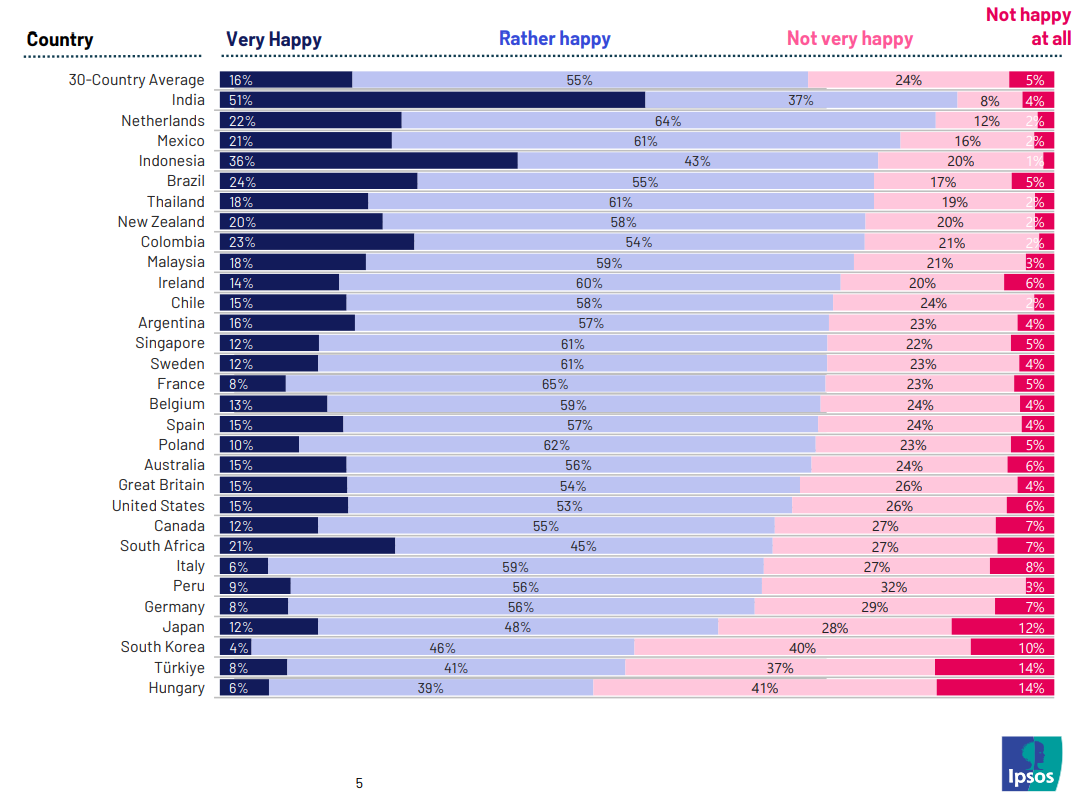Only 13 per cent of Japanese happy with their life, Indians among the happiest
According to the 2025 Global Happiness Index, happiness and satisfaction vary greatly among Asian countries. In India, 88 per cent say they are happy, while only 60 per cent say the same in Japan. In Southeast Asia, too, happiness and positive attitude towards the future are higher than in the more advanced economies of East Asia. Economic difficulties remain the first cause of unhappiness everywhere.
Tokyo (AsiaNews) – Only 13 per cent of Japanese are satisfied with their quality of life, and just 15 per cent think they can achieve improvements. Conversely, 74 per cent of the people in India say they like their quality of life while 88 per cent say they are "very" or "fairly" happy.
This is what emerges from the 2025 edition of the Global Happiness Index by the France-based research firm Ipsos, based on a survey conducted between December 2024 and January 2025 with a sample of almost 24,000 adults under 75 in 30 countries.
A clear difference seems to exist between developing Asian countries and the most industrialised nations. Compared to 2011, for example, South Korea has recorded a drop of 21 percentage points and today 50 per cent of South Koreans say they are happy, while only 24 per cent say they have a good quality of life.
About 60 per cent of Japanese are fully or fairly happy, 10 percentage points lower than 14 years. The main sources of dissatisfaction are mental health, the economic situation, and social pressures.
The Southeast Asian countries included in the survey show a much higher happiness index. About 79 per cent of respondents from Indonesia are either "very" and "fairly" happy, 78 per cent in Thailand, 76 per cent in Malaysia and 73 per cent in Singapore.
The future also varies greatly between East Asia and the rest of the continent. In India, 79 per cent of respondents expect an improvement in their quality of life, with Indonesia not far behind at 76 per cent, with Thailand at 70 per cent, Malaysia at 59 per cent, Singapore at 46; at the bottom, we find South Korea at 38 per cent and Japan at 15 per cent.
If in Europe and America mental well-being is increasingly important in determining happiness, in Asia it is family, love and a sense of control over one's life that are the determining factors. In India, for example, family relationships and feeling loved are the main drivers of happiness.
However, economic condition remains the strongest driver of unhappiness in all 30 countries surveyed. In general, money does not bring happiness, but the lack of economic opportunity certainly makes people unhappy.
Conversely, family and children, in addition to feeling appreciated or loved, seem to be the reasons that make people happier in most countries.
In Indonesia, 58 per cent of respondents who answered that they were unhappy cited financial condition as the main cause, compared to 21 per cent who indicated housing and living conditions.
Among Indonesians who answered that they were happy, the main reasons were feeling appreciated and loved (35 per cent) and feeling that their life had meaning (23 per cent).
Economic difficulties seem to be the main reason for Japanese pessimism.
“There are different reasons for different people, of course, but one of the biggest factors I feel is that for so long we have only experienced deflation and now suddenly we have soaring inflation,” said Hiromi Murakami, professor of political science at the Tokyo campus of Temple University, speaking to South China Morning Post.
“For more than 20 years prices were effectively the same and the government kept trying to get us out of deflation, and this is the result,” she added.
According to the latest forecasts, inflation in Japan could reach 12.2 per cent in 2025, putting a strain on households, despite attempts by recent governments to raise wages to keep up with the rising cost of living.
The Japanese case also shows a further general trend with older people happier than younger people in most of the countries involved in the survey.
“I just had a class and a girl who was maybe 19 years old said she was doomed. She said that the only thing she was going to do would be to get a job, work long hours so she could pay into the pension system for when she retires and that there was nothing to look forward to,” Murakami said.
“She was worried about taxes and about the pension system collapsing because there are not enough young working people. That’s very sad because these are the very people who should be so full of hope at this stage in their lives, when they should be dreaming about their futures.”
12/02/2016 15:14
22/07/2011







.png)










